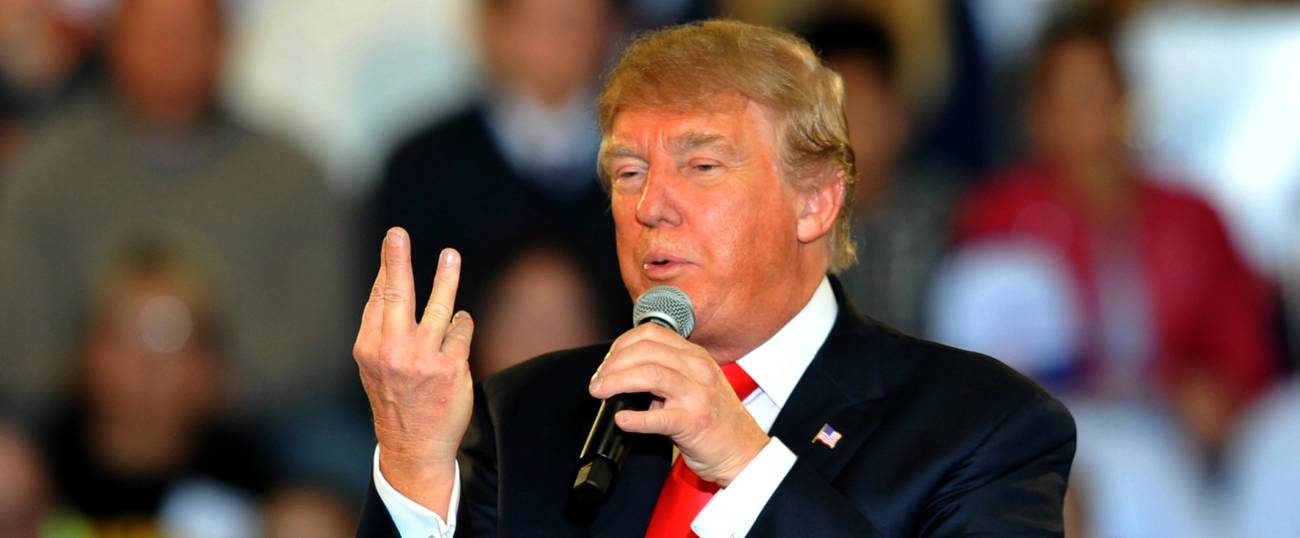Not Quite Hitler, But Much Like Henry Ford
One writer draws parallels between the bigotry of Donald Trump and the anti-Semitism of Henry Ford




Last week, Republican presidential candidate Donald Trump called for a ban on all Muslims entering the U.S. until “our leaders figure out what the hell is going on.” This drew bipartisan criticism. And yet Trump’s repugnant political idea has apparently bolstered his lead over all 12 (12!) of his seemingly hapless opponents.
Trump’s desire to keep out Muslim’s who are not U.S. citizens has prompted a number of ideological comparisons to Adolf Hitler—Trump himself shrugged it off and doubled-down—but Salon writer Arthur Chu, who was influenced by an August piece in The Atlantic, believes the comparison is not totally accurate. Despite the “scary” historical comparisons, “Trump doesn’t live in Hitler’s Germany and, to be blunt about it, he doesn’t have Hitler’s balls”:
The Adolf Hitler who took power in 1933 was a man who’d previously taken politics seriously enough to lead an armed revolution against the state and be imprisoned for it. His party already had a paramilitary wing (the SA) of organized, uniformed thugs who seriously thought of themselves as a rival to the existing military. He rose to power in a country that saw itself as a desperate underdog, having lost a major war and been forced to make massive reparation payments that crippled the economy.
None of this describes Donald Trump. It’s impossible to imagine the effete reality-show billionaire at the head of a Beer Hall Putsch or going to prison as a martyr for his cause. His supporters are violent, frightening, boorish mobs but they’re nothing at all like an army, not even the ersatz army the SA were. And despite how ugly things have gotten in the United States during the War on Terror we are still comfortably the world’s wealthiest superpower; Weimar Germany would be lucky to have our problems.
Instead, Chu writes that the political climate of America in 1924 better serves a comparison of Trump to the likes of Henry Ford, the founder of Ford Motor Company, who also briefly ran for the Republican presidential nomination. (It was ultimately won by Calvin Coolidge, who went on to become POTUS.) Chu outlines a number of parallel’s between Trump and Ford:
Like Trump, Ford vacillated about which party he even belonged to but seemed none the worse for wear for his shifting allegiances–his personal brand outshining the brand of whatever party he belonged to.
Like Trump, Ford’s popularity was blamed on mass media–in 1924 that was the “movie mind” overstimulated by Hollywood features; in 2015 it’s apparently the fault of the “social media mind” of self-sustaining Internet outrage.
Like Trump, Ford surged to national attention in 1924 because of the country’s deep disenchantment with the “serious” candidates, a sense that party politics was just a corrupt elite trading favors with each other–Trump, like Ford, somehow managed to be an “outsider” and to represent the “common man” despite being incredibly wealthy.
And, like Trump, Ford was beloved by his fans because he was perceived as a straight-talker, a truth-teller, someone insulated enough by his wealth he didn’t have to recite polite fictions. Among serious pundits of the chattering classes, an eccentric billionaire who goes on rants about the Protocols of the Elders of Zion or Barack Obama’s forged birth certificate has disqualified himself from being taken seriously for office. Among voters who hate and resent the serious pundits of the chattering classes, those “fringe” views only underscore the billionaire’s “outsider” credentials.
Ford, too, was a bigot—outwardly toward Jews. But “Henry Ford,” writes Chu, “for all his rants about rooting out Jewish influence in America and blocking further Jewish immigration, never actually proposed violent ethnic cleansing or a Final Solution. What he did propose sparked enough anger among the American mainstream that he was forced to back off of his position and publicly apologize… But Ford cheered the anti-immigration policies that kept Jewish people trapped in fascist states as anti-Semitic persecution continued to escalate.”
For now, Trump’s word are simply that—words—but “I don’t know where the chain of dominoes ends,” Chu writes. Read the rest of his article here.
Previous: The Elders of Zion: A ‘Secret Society’?
Related: Why Donald Trump Is the King of American Loser-dom
Israel Silenced Meir Kahane. Should the U.S. Do the Same with Trump?
Donald Trump, the Last of the Great Vaudevillians
How to Say You’re Sorry
Jonathan Zalman is a writer and teacher based in Brooklyn.